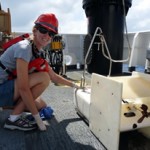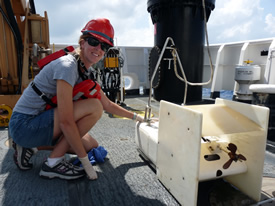 Lora Clarke received her Ph.D. from SoMAS in 2007. She also has a Bachelor of Science degree from Christopher Newport University in Virginia and a Master of Science from the University of Massachusetts. At SoMAS, she worked with former Dean David Conover on numerous fish ecology studies involving Atlantic silversides, Menidia menidia. Lora’s research concentrated on the population dynamics and connectivity of subpopulations of this species along the east coast of the United States.
Lora Clarke received her Ph.D. from SoMAS in 2007. She also has a Bachelor of Science degree from Christopher Newport University in Virginia and a Master of Science from the University of Massachusetts. At SoMAS, she worked with former Dean David Conover on numerous fish ecology studies involving Atlantic silversides, Menidia menidia. Lora’s research concentrated on the population dynamics and connectivity of subpopulations of this species along the east coast of the United States.After she graduated, Lora was awarded a prestigious John A. Knauss Marine Policy Fellowship by NOAA in 2008 and began working with the NOAA Fisheries Office of Science and Technology in Silver Spring, Maryland, where she served as the Ecosystems Project Coordinator. Her duties included assisting Dr. Steve Murawski, then NOAA’s Chief Scientist and Head of Scientific Programs, on programs related to ecosystem-based management. She also prepared international policy briefs and reports for Congress and helped administer CAMEO (Comparative Analysis of Marine Ecosystem Organization) – a new grant program co-sponsored by NOAA and the National Science Foundation.
After her one year fellowship ended, Lora was hired to stay on at NOAA to work on CAMEO. Currently, Lora develops goals and priorities for interdisciplinary ecosystem research, coordinates scientific review of research proposals and creates outreach plans to help promote the CAMEO program. In addition, Lora works with JSOST, the Joint Subcommittee for Ocean Science and Technology. JSOST is a group of 25 federal agencies organized under the White House Office of Science and Technology Policy that sets the national priorities for ocean science and technology research. Lora is one of two executive secretaries for the group.
Lora reflects on her SoMAS years…“The interdisciplinary nature of my education at SoMAS helped to prepare me for the work I am doing now and has helped to shape my career path. The breadth of courses, field work and lab experiences provided me with a strong well-rounded background in marine science and has allowed me to have the flexibility to pursue a career in science administration and policy. Working in internationally famous laboratories exposed me to leaders in the field and I was impressed by the willingness of faculty and students to collaborate with each other. This has helped me to successfully tackle the variety of marine ecosystem issues that I face in my job today. I am extremely thankful for my time at SoMAS.”




